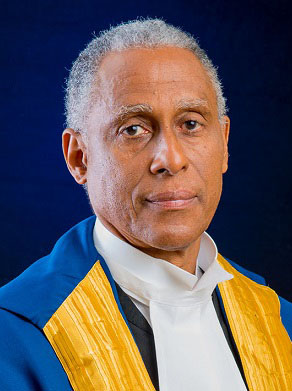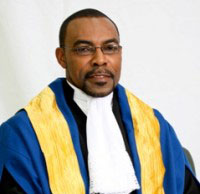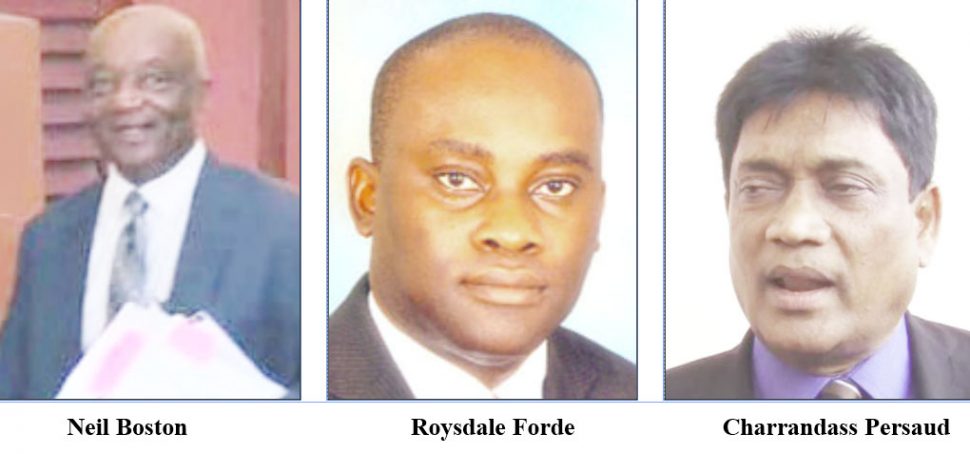As they had done the day before, judges of the CCJ yesterday continued to exhibit disfavour with the 34-32 formula that the government has advanced to thwart the December 21, 2018 motion of no confidence and the President of the court, Justice Adrian Saunders, rebuffed as inapplicable, a case which state lawyers had cited as a precedent.
The panel of five judges yesterday concluded hearing the controversial no-confidence motion case and related matters which had been tied up in the local courts for months. Significantly, before it hands down a decision, the Caribbean Court of Justice (CCJ) is inviting more submissions from the Guyana Elections Commission (GECOM) which the CCJ had added as a party to the case. Depending on how it rules, specific orders might be directed by the court to GECOM.
Attorney Roysdale Forde who represents former Minister of State, Joseph Harmon yesterday sought to add his voice to government’s argument that 34 and not 33 votes were required for passage of the no-confidence motion.

Despite his seeming best efforts, however, noting this over-stated position by government, a clearly frustrated Justice Saunders asked counsel to move on to other points as the court was no longer dealing with deconstructing the majority issue.
Apart from that, the judge in no uncertain terms disregarded one of the frequently-referenced cases used by the state in justifying its 34 over 33 majority argument, stating that the case represented an entirely different parliamentary reality.
The particular case, Justice Saunders noted, was in no way in sync with the facts of the challenge before the court.
The 34-32 formula is a key plank in the government’s bid to overturn the motion of no-confidence.
Meanwhile, in attempting to canvas the issue of the need for an “absolute” majority for passage of the motion and not just a “simple” majority, Justice Winston Anderson sought to enquire from Forde the reason he was trying to complicate a simple issue.
It was Forde’s argument, as have been that of other lawyers representing the state, that though Article 106 (6) did not include the word “absolute,” that it needed to be read into the provision and construed to so reflect.
Justice Anderson pointed out that all that provision simply says was a “majority,” stating to counsel, “with the greatest of respect, why are you trying to complicate it.”
The judge further went on to add that, “most people can tell you what the majority of 65 is,” explaining that it is 33, which represents the larger part of the whole. “We are spending a lot of time here on this,” Justice Anderson in seeming frustration stated.
It was at this juncture that Justice Jacob Wit interjected as he had previously done, that he wanted someone to enlighten him as to why 33 votes were required to pass legislation, but 34 are needed to send the government home.
“I’m still waiting for someone to show me,” the judge said.
Offering a response to Justice Wit’s enquiry, Forde submitted that the rationale behind the 34-number vote bears significance to the extent that it would prevent a constant collapse of government by a member of the House just merely crossing the floor.
To a question from Justice Saunders as to whether in a country like Guyana with proportional representation the majority will always be half plus one, Forde answered in the affirmative, contending that in such a case, no one from the opposition would be able to just step forward and in a vote overthrow the government.
Following the almost 6-hour hearing yesterday of what was the final of the 2-day appeal hearings, Justice Saunders said that the date for ruling will be announced and all parties will be notified.
The court has already indicated that that date would not be any time in the new week since it is desirous of having further submissions from GECOM.
Counsel for the Commission, Stanley Marcus, had indicated that he would be out of the jurisdiction during the course of next week, at which point Justice Saunders assured that that in no way would affect the court, as it would not be rendering its decision in that period.
Political and social evil
Meanwhile, calling Charrandass Persaud’s move of voting in favour of an opposition-sponsored no-confidence motion “a political and social evil,” attorney Neil Boston SC holds the view that a government Member of Parliament (MP) is to always be loyal to its party.
“There is no such thing as a conscience vote,” the Senior Counsel declared.
By his vote with the parliamentary opposition, government defector, Persaud, tipped the scales 33 to 32 in favour of the motion which was declared passed by Speaker of the 65-mmeber House.
Boston, who is representing private citizen Compton Reid, who is challenging the

validity of Persaud’s vote on grounds of his dual-citizenship, has argued that in accordance with Article 155 (1) (a) of the constitution, Persaud in the first place ought to have been disqualified from being a member of the National Assembly.
This article provides, “No person shall be qualified for election as a member of the National Assembly who is, by virtue of his or her own act, under any acknowledgment of allegiance, obedience or adherence to a foreign power or state.”
Persaud is also a citizen of Canada.
According to Boston, since Persaud’s dual-citizenship would have effectively ousted him from being a member of the National Assembly, his vote on the motion cannot be regarded as having been valid.
Apart from these factors, Boston argued that Persaud, being a candidate and representative of a party list, could not himself cast a vote with the deciding effect of causing the entire collapse of the government.
To this end, Boston advanced that in accordance with Article 156 (3), he would be barred from “crossing the floor,” and voting with the opposition, as that provision requires such a person to communicate to the head of that list that he no longer wants to support it.
Against this background, the lawyer declared that loyalty to the party is not only the norm, but of grave importance, and to vote against it, amounts to disloyalty “and smacks of conspiracy with the other side.”
Boston sought to advance to the court that Persaud could not vote for himself, but rather for the party list from which his name was extracted. The lawyer went on to argue that this was the case, as electors did not vote directly for Persaud as an MP, but rather for an entire list.
On this point, he added that it was for such a reason that the seat which Persaud occupied in the National Assembly was not his own, but rather that it belonged to the party.
Grilling Boston on this argument, Justice David Hayton sought to enquire from him the relevant law which says that Persaud was under an obligation to vote for the party list from which his name was extracted.
The judge opined that if this was the intention of the framers of the constitution, they would simply have included such a provision.
Unable to point the court to any such statute, however, Boston submitted that the letter and spirit of Article 156 (3) had to be read by the court and construed in such a way as to so give effect.
Interpreters
He argued that as interpreters of the constitution, the court is duty-bound to so find.
That article states, “A member of the National Assembly elected on a list shall be disqualified from being a member of the National Assembly, if he or she, in the prescribed manner, declares that he or she will not support the list from which his or her name was extracted or, declares that he or she abstain from supporting that list or, declares his or her support for another list.”
Given Boston’s reasoning and the existence of Article 106 (6), however, Justice Winston Anderson enquired from him the circumstances in which the government can fall, if an MP on either side cannot cross the floor.
Article 106 (6) provides, “The Cabinet including the president shall resign if the government is defeated by the vote of a majority of all the elected members of the National Assembly on a vote of confidence.”
As far as Boston is concerned, however, that article is given effect only in instances where government members are bringing a “vote of confidence” against it and not for the opposition to mount a “no-confidence” motion against it.
Observing, however, from the lawyer’s reasoning, that one always had to vote in favour of their party list, Justice Saunders sought to enquire from Boston whether it was his position that votes would remain fixed. To the seeming surprise of the court, the lawyer answered in the affirmative.
Opining, however, that 106 (6) “must make some sense” and must have been inserted into the constitution for a reason, Justice Maureen Rajnauth-Lee observed that one could not be voting for any list.
Boston maintained, however, that “it is unconstitutional the way Persaud voted against the list he was a part of,” and to that end asked the court to so find.
“There is no such thing as a conscience vote,” the lawyer declared; adding that when Persaud voted in favour of the no-confidence motion, it was “a political and social evil,” submitting that Article 156 (3) seeks to curb such acts of conspiracy at attempts to overthrow the government.
Asked whether the option of abstaining was available to Persaud, Boston said it was not, while stating that would implicitly be an expression of non-support for the list.
Strait jacket
“So you are essentially always in a strait jacket,” Justice Anderson interjected to enquire from Boston, who responded yes.
It was then Justice Wit said that he was having repeated difficulty in understanding why after the vote and declaration of the passage of the motion that none of the politicians in the House immediately made any objections, yet a flood of such came after.
To this, Boston offered the response that he could not say, and that it is the courts which are tasked with interpreting the law in the litigation mounted.
Referencing Article 58 (1) the lawyer labelled Persaud an “interloper” and a “usurper,” who knew he ought not to have been in the National Assembly by virtue of his dual citizenship and that before the vote on the night of December 21st, would not be supporting his party list.
Article 58 (1) states, “Any person who sits or votes in the National Assembly, knowing or having reasonable ground for knowing that he or she is not entitled to do so, shall be liable to a penalty of fifty dollars for each day upon which he or she so sits or votes.”
Having outlined his arguments, Boston begged the court to invalidate Persaud’s vote.
Persaud’s lawyer Sanjeev Datadin, as members of the Bench had also observed, sought to ask what the preoccupation was with his client, when there were other dual citizen members on both sides of the House, occupying parliamentary seats.
Against this background, Datadin questioned the government’s position as to the many pieces of legislation which would have been debated and passed with the assistance of Persaud’s vote in the House since 2015.
“What would become of all those contributions,” counsel questioned.
Adding to arguments made by Datadin, Senior Counsel Douglas Mendes who represents Opposition Leader Bharrat Jagdeo by whom the motion was laid, had emphasized that Article 58 (1) provided sanctions for persons sitting in violation of the National Assembly.
Outside of that, however, he said that the issue of Persaud’s purported disqualification from ever being a proper sitting member of the National Assembly could not be addressed by the court, as it has no jurisdiction to hear such a challenge.
According to Mendes, a challenge to such a state of affairs owing to Persaud’s dual citizenship, ought to have been mounted by way of an elections petition, as it touches and concerns what he said were elections matters.
The lawyer said, however, that the statutory 28-day period having long expired for mounting such challenges following the elections of May, 2015, can no longer be brought and cannot be taken before the courts either.
He told the court that such election matters are to be dealt with in accordance with the National Assembly Validity of Elections Act.
In keeping with pronouncements made by the Guyana Court of Appeal, all dual citizen MPs on both sides of the House have since resigned.
Though initially accepting the motion to have been validly passed, government days later sidestepped, arguing that the proper majority needed for passage of the motion was 34 votes, which represents an “absolute” majority as required for passage of the motion, as opposed to a “simple” majority of 33.
The state’s case is that in Guyana’s 65-member National Assembly, half would result in a fraction of 32.5. If it is to be rounded to the next whole number, that figure will be 33 and in accordance with the practice and the application of the meaning of what is needed for an “absolute majority,” one has to be added to calculate that required majority.
On March 29th, noting that the matters are all related, the CCJ consolidated the three separate appeals filed on the no-confidence motion.
The three challenges to the motion are Christopher Ram against the Attorney General (AG), the Leader of the Opposition and Harmon; Jagdeo against the AG, Speaker Dr Barton Scotland and Harmon; and Persaud against Reid, Dr Scotland, Jagdeo and Harmon.
The no-confidence motion, sponsored by Jagdeo, was declared passed by Dr Scotland following a vote in its favour by then APNU+AFC parliamentarian Persaud on the night of December 21st.
Following a challenge by government in the High Court, Chief Justice (Ag) Roxane George-Wiltshire found that even though Persaud was made a parliamentarian in violation of the Constitution, his vote was valid and that the December 21st no-confidence motion against the APNU+AFC government was validly passed with the votes of 33 elected members of the 65-member Assembly. She has also ruled that the passage of the motion should have triggered the immediate resignation of the Cabinet.
The Guyana Court of Appeal, by a majority decision, on March 22nd overturned the Chief Justice’s ruling, saying that the correct mathematical formula for finding the “absolute” majority was not used.
While Chancellor Yonette Cummings-Edwards (Ag) and Justice of Appeal Dawn Gregory agreed that 34 votes were required for the motion to be carried, Justice of Appeal Rishi Persaud dissented.
Ram has asked the court to, among other things, validate the December 21st passage of the motion by the National Assembly.










